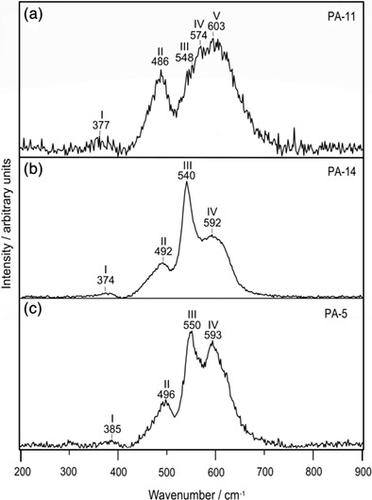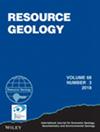超镁铁质岩石中红土中铁和锰氧氢氧化物的光谱和化学研究
IF 0.8
4区 地球科学
Q3 GEOLOGY
引用次数: 2
摘要
铁(Fe)氢氧化物(针铁矿和赤铁矿)和锰(Mn)氢氧化物(石斑岩、石斑岩、石斑岩-石斑岩中间)本质上通常是细粒的,结晶体很差,因此很难通过传统的X射线粉末衍射来识别。本研究采用拉曼光谱和电子探针显微分析(EPMA)对菲律宾巴拉望岛Berong镍钴红土矿床中发现的Fe -和Mn -氢氧化物进行了表征。这些矿物的准确鉴定是重要的,因为这些相含有高镍和钴含量。针铁矿和赤铁矿出现的结构范围很广,这与它们在Ni、Al、Mn、Cr和Si方面的成分变化有关。拉曼峰强度的变化可能与针铁矿中Ni、Al、Mn、Cr和Si浓度的变化有关。这些化学变化影响针铁矿从无定形到隐晶的结构转变。用拉曼光谱对石蛭石、火山灰石及其中间体进行了正确的区分。EPMA数据表明,这些Mn矿物含有相当浓度的Ni、Co、Al和Fe。在486 ~ 593 cm−1范围内,从石斑岩到泥斑岩端项的带移表明,石斑岩中的Al被Ni、Co和Fe取代。本文章由计算机程序翻译,如有差异,请以英文原文为准。

Spectral and chemical studies of iron and manganese oxyhydroxides in laterite developed on ultramafic rocks
Iron (Fe) oxyhydroxides (goethite and hematite) and manganese (Mn)‐oxyhydroxides (lithiophorite, asbolane, lithiophorite‐asbolane intermediate) are typically fine‐grained and poorly crystalline in nature, and as such are difficult to identify by conventional X‐ray powder diffraction. This study employs Raman spectroscopy and electron probe microanalysis (EPMA) to characterize Fe‐ and Mn‐oxyhydroxides found in the Berong Ni–Co laterite deposit at Palawan Island, Philippines. Accurate identification of these minerals is important because these phases contain high Ni and Co contents. Goethite and hematite occur in a wide range of textures, which are related to their compositional variations with respect to Ni, Al, Mn, Cr, and Si. The change in the intensity of the Raman peaks can be linked to the variable concentrations of Ni, Al, Mn, Cr, and Si in goethite. These chemical variations affect the textural transformation of goethite from amorphous to cryptocrystalline. Lithiophorite, asbolane and their intermediates were properly distinguished using Raman spectroscopy. EPMA data shows that these Mn minerals contain appreciable concentrations of Ni, Co, Al, and Fe. The band shift from lithiophorite to asbolane end terms in the 486–593 cm−1 domain indicates the substitution of Al in lithiophorite by Ni, Co, and Fe.
求助全文
通过发布文献求助,成功后即可免费获取论文全文。
去求助
来源期刊

Resource Geology
地学-地质学
CiteScore
2.30
自引率
14.30%
发文量
18
审稿时长
12 months
期刊介绍:
Resource Geology is an international journal focusing on economic geology, geochemistry and environmental geology. Its purpose is to contribute to the promotion of earth sciences related to metallic and non-metallic mineral deposits mainly in Asia, Oceania and the Circum-Pacific region, although other parts of the world are also considered.
Launched in 1998 by the Society for Resource Geology, the journal is published quarterly in English, making it more accessible to the international geological community. The journal publishes high quality papers of interest to those engaged in research and exploration of mineral deposits.
 求助内容:
求助内容: 应助结果提醒方式:
应助结果提醒方式:


